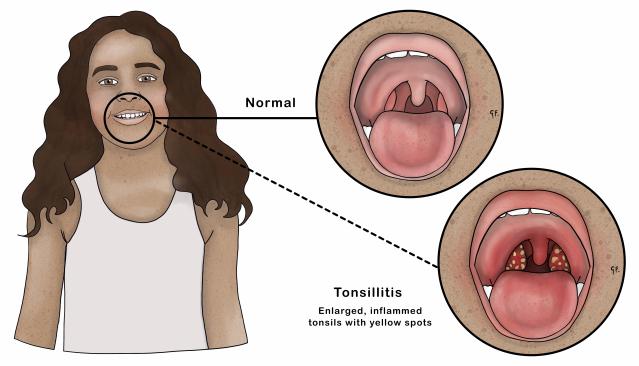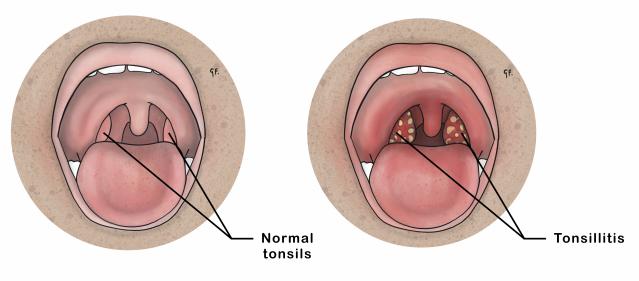Key points about tonsillitis in children
- tonsillitis is common in tamariki and rangatahi
- tonsillitis is where the tonsils become inflamed because of an infection
- symptoms include a sore throat, trouble swallowing and swollen neck glands
- if you think your child has tonsillitis, take them to a health professional

What is tonsillitis?
Tonsillitis is inflammation of the tonsils. The tonsils are fleshy pads on either side of the throat. They are made of lymph tissue, which helps fight infections.

Symptoms of tonsillitis
Tonsillitis causes a sore throat. Your child may have other symptoms including:
- fever
- trouble swallowing
- swollen sore glands in the neck
- headache
- cold symptoms
The symptoms your child has will depend on what is causing their tonsillitis. Some children may also get a rash at the same time as their tonsillitis.
Causes of tonsillitis
Viral or bacterial infections cause tonsillitis. These infections are often spread through coughing, sneezing or touching contaminated surfaces.
Viruses
Viruses that cause the common cold, flu and glandular fever can all cause tonsillitis.
Glandular Fever In Children & Young People
Bacteria
Sometimes, a bacterial infection can cause tonsillitis. Bacterial causes include streptococcal infection, which causes strep throat. If strep throat is not treated, it can cause complications like rheumatic fever.
When to get medical help for tonsillitis
If you think your child has tonsillitis, take them to a health professional. It is important that they get checked for strep throat. The health professional will examine your child to try to work out the cause of their tonsillitis.
Why it's important for your child to see a health professional
It's difficult to tell the difference between a viral sore throat and strep throat.
Sometimes, children can get strep throat. A rare complication of strep throat is rheumatic fever. Your child should see a health professional if they have a sore throat to get tested for strep throat.
If the health professional thinks your child has strep throat or they test positive on a swab, the health professional will give your child antibiotics. Antibiotics can help prevent your child from developing rheumatic fever.
When to get urgent medical help
See a health professional urgently if your child has any of the following:
- frequent vomiting
- they refuse to eat or drink
- they're unable to eat or drink
- dehydration - they're doing less wees than usual, or no wees at all
- they look pale and floppy
- trouble swallowing their saliva
- trouble breathing
- a stiff neck
Treatment for tonsillitis
The treatment for tonsillitis depends on what is causing your child's tonsillitis.
Antibiotics
A health professional will prescribe antibiotics if your child has bacterial tonsillitis or suspected bacterial tonsillitis, such as strep throat. Antibiotics help treat the infection and prevent complications. It's important that your child completes the full course of antibiotics as directed, even if symptoms improve before the medicine is finished.
If a health professional thinks your child has viral tonsillitis, they will not prescribe antibiotics, as antibiotics do not treat viral infections.
Pain relief medicine
Paracetamol
If your child has pain, you can give paracetamol to make them more comfortable. You must follow the dosage instructions on the bottle. It is dangerous to give more than the recommended dose.
Other medicine
If your doctor gives your child ibuprofen (such as Nurofen or Fenpaed), or if you buy it at the pharmacy, follow the dosage instructions carefully. It is dangerous to give more than the recommended dose.
Never give your child aspirin, as this may increase the risk of Reye syndrome, which is a rare and serious illness.
Caring for your child with tonsillitis at home
Encourage your child to rest
Your child may feel tired when they have tonsillitis, so encourage them to rest.
Give plenty of fluids
Encourage your child to drink plenty of fluids when they are unwell. Offer small, frequent sips of water. Your child may prefer cool liquids or ice blocks. Warm liquids like honey and lemon drinks may help soothe a sore throat.
Warm salt water gargle
Your child may find that a saltwater gargle helps ease their sore throat. You can make this by mixing 1 teaspoon of salt into a glass of warm water. Tell your child to spit it down the sink after they gargle - make sure they don't swallow the salt water, as this can upset their tummy.
Offer soft foods
Certain types of foods may be uncomfortable for your child to eat. Offer your child soft, easy-to-swallow foods such as soups and smoothies.
Tonsillitis can come back
Because bacteria and viruses are spread through coughing and sneezing, your child can get tonsillitis again. Some tamariki and rangatahi get repeated episodes of tonsillitis.
Practising good hygiene, such as regular handwashing and staying away from others when sick, can help reduce the chance of spreading infections.
Will my child need to have their tonsils removed?
Your child's doctor may recommend an operation if your child gets tonsillitis frequently. The operation is called a tonsillectomy, which involves removing the tonsils. If your child has frequent or severe tonsillitis impacting their life and school, they may benefit from tonsillectomy.
Sometimes your child’s tonsils can stay enlarged, even when the infection has settled. If they also have significant snoring with large tonsils, even when they are well, this may be a reason to consider tonsillectomy.
Acknowledgements
Illustrations by Dr Greta File. Property of KidsHealth.
